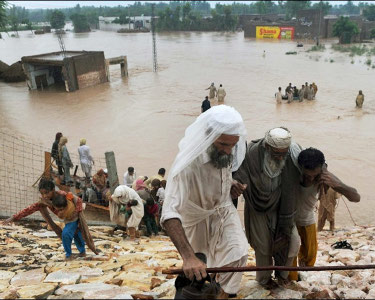
Chichawatni, Sahiwal district have charged a mentally ill Christian with
“injuring religious feelings” under Pakistan’s widely condemned
blasphemy laws.
Three families related to 25-year-old Babar
Masih – the only other Christian families in the area – have fled their
homes after a Muslim mob threatened to harm them, relatives of the
accused told Compass.
Police in Chichawatni, Punjab
Province registered the blasphemy case against Masih on Monday (May 2)
after arresting him at about 10 p.m. that night. Son of Iqbal Masih in
Shakir Colony, Chichawatni Bypass, the young man’s own family handed him
over to police because a large number of Muslim clerics had gathered
outside their house and demanded that he be turned over to them so that
they could “do justice” by killing him, relatives said.
A
Muslim neighbor, Rana Sardar, had told Masih’s family that the police
should be called so that he could be taken into custody, “otherwise he
would be killed by the Muslim clerics who were getting more charged up
with every passing moment,” a relative said. With a large number of
people gathered at the house when police arrived, Babar Masih was handed
over from another gate and immediately put into a police van.
When
the clerics saw Masih being put into the police van, they rushed toward
it and tried to take hold of him. They continued chasing after the
vehicle as it carried him away, giving the three families related to
Masih’s immediate family the opportunity to flee from their homes,
relatives said. At press time they were still in hiding.
Masih’s
brother, Amjad Masih, said that after fleeing from their home, he
talked with neighbors who told him that several other neighbors had been
pressured by Muslim clerics to go to the police station to provide
testimony against the accused.
“These neighbors were of
the opinion that they could not refuse to give evidence after the Muslim
clerics forced them, telling them that they were coming out of the
mosque after prayer when Babar Masih used abusive language against the
prophet Muhammad,” Amjad Masih said. “They told me, ‘It is such a
sensitive matter that we could not refuse.’”
He said Babar
Masih has suffered a mental illness for the past six or seven years
typified by fits of unprovoked rage. He said that his brother’s loss of
mental balance was reflected in abusive language and lack of concern for
food and clothing.
Amjad Masih told Compass that he had
learned from witnesses that Babar Masih was walking by the Canal Mosque
looking upward and calling out names as the mosque leader was coming out
and heard him using abusive language about Muhammad. He said he did not
learn about the alleged incident until he had returned from an area
bazaar.
“When I reached home I saw a large number of
Muslim clerics that had gathered outside our house,” he said. “I believe
they had come from other cities, because I cannot identify them and
they were not of our area.”
When he asked why they had
gathered there, he said, the clerics told him that Babar Masih had used
insulting language about Muhammad, which can be punishable by death in
Pakistan. His older brother James Masih, he said, had locked the accused
in a room. He confirmed that neighbors believed that the clerics would
kill Babar Masih unless police were informed.
Police were
not available for comment at press time. Representatives from a human
rights organization have met with Babar Masih in Sahiwal Central Jail,
where he has been since Tuesday (May 3).
Masih was charged
under Section 298 of Pakistan’s blasphemy statues for “uttering words . .
. with deliberate intent to wound religious feelings” and Section 298-A
for “use of derogatory remarks . . . in respect of holy personages.”
Attorney
Khurram Shehzad Maan of the European Center for Law and Justice’s
office in Pakistan said that the complainant in the case was not the
cleric who allegedly saw Babar Masih speaking ill of Muhammad and other
Islamic figures, but rather a dairy farmer named Zeeshan Arain whose
property is on the same street as Babar Masih’s. He said the police
should have examined him to confirm whether he was insane, as Babar
Masih’s family had informed them.
Maan said that Section
84 of Pakistan Penal Code states, “Nothing is offense which is done by a
person who, at the time of doing it, by reason of unsoundness of mind,
is incapable of knowing the nature of the act, or that he is doing what
is either wrong or contrary to law.” Therefore, he said, police had the
option of sending him to a mental asylum rather than registering a First
Information Report.
In the FIR, Arain clearly states that
Babar Masih was addressing the stars as he allegedly cried out against
the prophet and holy personages of Islam, Maan said.
“It
means that the police must have come to know since the beginning that
Babar was not a sane person, who was addressing stars, and also Babar
never meant to injure feelings of any Muslims,” Maan added.
Amjad
Masih said that the few neighbors who were not siding with the
murderous mob had told him not to return home, as police out of uniform,
the clerics and several others were visiting their houses to see if
they had returned.
“I want to go back home,” he said. “We
have business there, and we don’t want to leave the place, but we fear
that the people will attack us. We do not have any idea how to respond
in this situation.”
With tensions running high in the area,
on Thursday (May 5) there was a meeting known as a panchayat in which
Islamic clerics from all major mosques of the local and surrounding
areas gathered with Christian representatives. Christians argued that
Babar Masih was insane, and that in any event the Christian families
were not responsible for whatever he may have done and should be allowed
to return to their houses.
Muslims at the meeting,
however, were reluctant to allow the three families to return home,
saying they needed three days to consider it. Sources said the situation
was still tense and that the government should be aware that attacks on
other Christians was possible.
Pakistan’s blasphemy laws
have drawn condemnation across the world, and two senior government
officials – Punjab Gov. Salman Taseer, a liberal Muslim, and Federal
Minister for Minorities Shahbaz Bhatti, a Christian, have been
assassinated this year for demanding a review of the legislation.































































